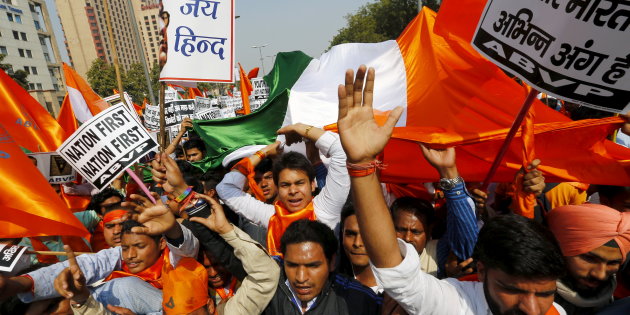The Akhil Bharatiya Vidyarthi Parishad (ABVP), a student group affiliated with the RSS, celebrates the anniversary of its founding on July 9, asrashtriya chhatra diwas, or national students day. The organisation, which was founded in 1949, claims to be inspired by a variety of people – from V.D. Savarkar to Bhagat Singh, Swami Vivekananda to B.R. Ambedkar, Subhash Chandra Bose to Sardar Vallabhbhai Patel. That these figures held opinions that opposed each other doesn’t seem to bother the ABVP.
Yet, of all these people, the one personality the organisation truly endorses in practice is Savarkar, not Vivekananda.
Since the BJP’s massive 2014 victory, the ABVP has seemed to enjoy an impunity on college campuses across the country, getting away with hooliganism and the disruption of events with ease. Here’s a brief summary of ABVP’s most infamous actions so far.
In August 2016, ABVP members attempted to burn Amnesty India’s effigy outside its office in Bengaluru after it held an event on human rights violations in Kashmir.
Before that, in May 2016, ABVP students at Jadavpur University screened Vivek Agnihotri’s political drama Buddha in a Traffic Jam on campus – despite being denied permission by the administration. They also manhandled and molested female students during the clashes.
In February 2017, ABVP members famously disrupted a seminar at Ramjas College, Delhi University because Umar Khalid and Shehla Rashid were due to speak at this event. The organisation justified its actions by stating that the campus had no space for ‘anti-national’ activities.
In May 2017, the students of IIT-Madras organised a ‘beef fest’ inside their campus. A PhD scholar was assaulted by ABVP members for attending the event – his right eye, gravely injured.
Recently, the organisation’s National Executive Committee said that Rohingya refugees and their “anti-national” activities were a “growing threat” to the country and asserted that the centre should deal with them strongly.
According to its constitution, the ABVP aims to build an ideal student movement which will work in the wider context of national reconstruction. It firmly believes in constructive activity, in the existence of an educational community and the need to stay above partisan politics. It’s actions in the last two years don’t just say otherwise, they also contradict the views of Vivekananda, one of the men the ABVP apparently looks up to.
Vivekananda, in his Chicago address, had stated, “We believe not only in universal toleration, but we accept all religions as true. I am proud to belong to a nation which has sheltered the persecuted and the refugees of all religions and all nations of the earth.”
His views on beef eating and Hinduism would also surprise some ABVP members. Vivekananda said, “You will be astonished if I tell you that, according to old ceremonials, he is not a good Hindu who does not eat beef. On certain occasions, he must sacrifice a bull and eat it.”
On “sectarianism, bigotry, and its horrible descendant, fanaticism,” he said, “They have filled the earth with violence, drenched it often and often with human blood, destroyed civilisations and sent whole nations to despair. Had it not been for these horrible demons, human society would be far more advanced than it is now.
The ABVP is neither non-partisan, nor do its activities count as constructive. If anything, the values it seems to live by these days don’t reflect its own constitution, rather they indicate the organisation’s infiltration by regressive ideals.
With one of the world’s youngest (and largest) populations heading into elections next year, the following months (and years) are going to be instrumental for India – but they may also be some of the darkest witnessed by India’s university campuses.
Vivashwan Singh is studying political science, history and English at Christ University.
Featured image credit: Reuters/Adnan Abidi

